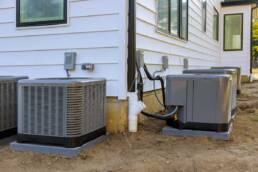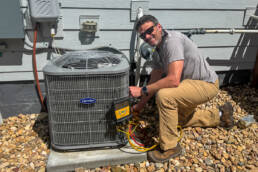Living in North Denver, you know the weather doesn’t mess around. One day you’re sweating through a Thornton summer scorcher, the next you’re bundling up against a Westminster winter freeze. Your HVAC system is the unsung hero keeping your home livable through it all. But when that hero starts wheezing, clanking, or just plain failing, it’s time to face the music: you might need a new HVAC. At Ascent MFS, we’ve seen it all, and our owner, Mike Murray, isn’t here to sell you a gold-plated furnace you don’t need. We’re here to help North Denver homeowners spot the signs of a dying HVAC and explain why waiting could hit your wallet harder than a Colorado hailstorm. Let’s dive into the five telltale signs your HVAC is begging for retirement—and why acting now saves you money.
Sign #1: Your Energy Bills Are Skyrocketing
If your Xcel Energy bill looks like it’s trying to fund a moon landing, your HVAC might be the culprit. Older systems lose efficiency over time, working harder to keep your North Denver home comfortable. In places like Arvada or Broomfield, where summer highs hit the 90s and winter lows dip below zero, an inefficient HVAC is like burning cash to stay cool or warm. But it’s not just about high bills—there’s a whole cascade of issues that make this a red flag you can’t ignore.
Why It Happens
As HVAC systems age (think 10-15 years or more), components like compressors, motors, and heat exchangers wear out, forcing the system to guzzle energy. Dirty filters, leaky ducts, or outdated tech—like single-stage compressors that run full blast even when you don’t need it—can make things worse. North Denver’s climate adds another layer of pain. The constant cycling between scorching summers and frigid winters puts extra strain on aging systems, especially in older homes in Westminster or Thornton with less-than-ideal insulation. According to the U.S. Department of Energy, a new, high-efficiency HVAC can cut energy use by up to 20-40% compared to an old clunker. That’s not pocket change—it’s enough to cover a few ski trips to the Rockies.
What You’re Losing
Beyond the obvious hit to your wallet, an inefficient HVAC drags down your home’s overall performance. It might struggle to maintain humidity levels, leaving your Northglenn home feeling muggy in summer or bone-dry in winter. This can lead to secondary costs, like mold remediation or cracked woodwork. Plus, North Denver’s rising energy rates mean the gap between an old system’s costs and a new one’s savings is only growing. Ascent MFS sees this all the time: homeowners shocked to learn their 90s-era furnace is costing them hundreds extra per year. Mike’s take? “If your AC’s eating more power than your kid’s gaming console and your neighbor’s crypto mining rig combined, it’s time to talk replacement.”
Why Waiting Costs More
Every month you limp along with an energy-hogging system, you’re throwing money at higher bills—sometimes $50-100 more per month in peak seasons. An overworked HVAC is also more likely to break down, leading to emergency repairs that can cost $500 or more. In North Denver’s competitive housing market, an inefficient system can even lower your home’s value, as buyers prioritize energy-saving features. At Ascent MFS, we help Thornton and Westminster homeowners pick systems with high SEER (Seasonal Energy Efficiency Ratio) ratings and features like variable-speed motors that adjust output to save energy. We also guide you through Xcel Energy rebates to offset costs. Waiting only digs a deeper financial hole—act now to stop the bleed.
Sign #2: Your Home Feels Like a Weather Map
Does your North Denver home have hot spots in the living room and Arctic zones in the bedroom? Uneven heating or cooling is a red flag your HVAC is struggling. In neighborhoods like Federal Heights or Northglenn, where older homes often have quirky layouts, a failing system can’t keep up with the demand for consistent comfort.
Why It Happens
An aging HVAC might have a failing compressor, low refrigerant, or ductwork issues, making it hard to distribute air evenly. In multi-story homes, this problem is especially noticeable—upstairs feels like a sauna while the basement’s a freezer. North Denver’s extreme temperature swings only amplify the issue, as your system scrambles to handle 90°F one day and 30°F the next.
Why Waiting Costs More
Uneven temperatures force your HVAC to run longer, spiking energy costs and wearing out parts faster. You might also resort to space heaters or fans, adding to your expenses. Ascent MFS specializes in sizing and installing HVAC systems that match your home’s unique needs, ensuring every room feels just right. “Your house shouldn’t feel like a climate warzone,” Mike says. “We’ll fix that.”
Sign #3: Your HVAC Sounds Like a Horror Movie
If your furnace sounds like a banshee or your AC clanks like it’s auditioning for a haunted house, it’s not possessed—it’s just done. Strange noises like banging, rattling, or grinding are a cry for help from your HVAC system, and North Denver homeowners should listen up.
Why It Happens
Noises often signal loose or broken components—think worn-out belts, failing motors, or debris in the system. In North Denver’s dusty environment, dirt buildup can stress your HVAC, causing parts to grind or vibrate. Older systems are especially prone as they near the end of their 12-20-year lifespan.
Why Waiting Costs More
Ignoring those noises invites bigger breakdowns, like a seized compressor or a cracked heat exchanger, which can cost thousands to repair—or worse, pose safety risks like carbon monoxide leaks. Ascent MFS’s team in Westminster and Thornton can diagnose the issue and recommend whether repair or replacement makes sense. Mike’s advice? “If your furnace sounds like it’s coughing up a lung, don’t wait for the sequel.”
Sign #4: Repairs Are Becoming Your Second Job
Is your HVAC tech on speed dial? If you’re calling Ascent MFS or another North Denver service more than once a season, your system is waving a white flag. Frequent repairs are a clear sign it’s time to consider HVAC replacement in North Denver.
Why It Happens
HVAC systems, like cars, hit a point where maintenance can’t keep up with wear and tear. Components like capacitors, fan motors, or thermostats fail more often in older units, especially under the strain of Colorado’s weather. If your system’s over 15 years old, it’s likely built with outdated tech that’s harder to fix.
Why Waiting Costs More
Each repair adds up—$200 here, $500 there—and soon you’ve spent enough to cover a down payment on a new system. Plus, constant breakdowns mean discomfort and stress, especially during a North Denver heatwave or snowstorm. At Ascent MFS, we offer transparent assessments to help you decide if a new HVAC is the smarter investment. “I’d rather fix it,” Mike says, “but if your system’s a money pit, I’ll tell you straight.”
Sign #5: Your System Is Older Than Your Teenager
If your HVAC system was installed when flip phones were cool, it’s probably time for an upgrade. Most systems last 12-20 years, but in North Denver’s harsh climate, even well-maintained units lose steam. Older systems also lack the efficiency and smart features of modern HVACs, leaving you stuck in the energy Dark Ages. Upgrading isn’t just about comfort—it’s about future-proofing your home.
Why It Happens
Age takes a toll on every part of an HVAC system, from the thermostat to the ductwork. Units from the early 2000s or earlier often have SEER ratings as low as 8-10, compared to today’s 14-20+ for new models. In North Denver, where energy costs are climbing faster than a hiker on a 14er, that efficiency gap is a budget killer. Older systems also lack smart tech, like programmable thermostats or zone control, which can save 10-20% on energy use by tailoring output to your schedule. Plus, many older units use R-22 refrigerant, which is phased out and insanely expensive to replace—think $100+ per pound.
What You’re Missing
Modern HVACs are game-changers for North Denver homeowners. High-efficiency systems with variable-speed blowers adjust output to match the weather, saving energy during mild Arvada springs or brutal Thornton winters. Smart thermostats let you control your system from your phone, so you’re not heating an empty house while you’re at a Broomfield brewery. Ascent MFS often sees clients in Northglenn or Federal Heights amazed at how much quieter and more responsive new systems are. “Your HVAC shouldn’t be old enough to vote,” Mike quips. “Let’s get you into the 21st century with a system that doesn’t act like it’s stuck in Y2K.”
Why Waiting Costs More
An ancient HVAC isn’t just inefficient—it’s a ticking time bomb for major failures. A sudden breakdown during a January deep freeze or July heatwave can leave you scrambling for emergency repairs costing $1,000 or more. Older systems are also less reliable, increasing the risk of damage to your home, like frozen pipes or mold from poor humidity control. Replacing proactively lets you plan the investment, lock in Colorado rebates through Xcel Energy, and claim federal tax credits (up to $2,000 for qualifying systems in 2025). Ascent MFS helps you navigate these incentives and choose a system that balances upfront cost with long-term savings. Waiting only invites chaos and higher costs—don’t let your HVAC retire on its own terms.
Why North Denver’s Weather Makes Waiting Risky
North Denver’s climate is no joke. Summers bring triple-digit heat indexes, while winters can dump feet of snow and plunge temps below zero. Your HVAC doesn’t get a day off, and a failing system can leave you stranded when you need it most. In neighborhoods like Thornton or Northglenn, where many homes were built decades ago, outdated HVACs are common. Waiting to replace a struggling system risks:
- Emergency Breakdowns: A dead furnace in a January blizzard or a busted AC during a July heatwave isn’t just uncomfortable—it’s dangerous.
- Higher Costs: Delaying replacement means higher energy bills, frequent repairs, and potential damage to your home (like frozen pipes or mold from poor humidity control).
- Lost Savings: Colorado offers rebates through Xcel Energy and federal tax credits for energy-efficient HVACs, but these programs can change or expire.
At Ascent MFS, we get it—nobody wants to drop cash on a new HVAC. But our team, led by Mike Murray, is here to make the process painless. We’ll assess your North Denver home, recommend systems that fit your budget and needs, and handle the installation with zero upsells. From Westminster to Federal Heights, we’re the crew homeowners trust for HVAC replacement done right.
How Ascent MFS Helps North Denver Homeowners
When you’re ready to ditch your dying HVAC, Ascent MFS is your go-to in North Denver. Here’s what sets us apart:
- Honest Assessments: Mike and our team won’t push a replacement if a repair will do. We’ll give you the straight scoop on what’s best for your home.
- Custom Solutions: Whether you’re in a Thornton ranch or a Broomfield two-story, we size and install systems for maximum efficiency and comfort.
- Energy Savings: We recommend high-efficiency units that qualify for rebates and cut your energy bills, so your investment pays off.
- Local Expertise: From Arvada’s older homes to Northglenn’s newer builds, we know North Denver’s unique needs and weather challenges.
Our process starts with a free consultation. We’ll inspect your current system, discuss your goals (like lower bills or quieter operation), and provide a clear quote. No pushy sales, no hidden fees—just Mike’s no-nonsense approach to HVAC replacement in North Denver.
Don’t Wait Until It’s Too Late
A failing HVAC isn’t just an inconvenience—it’s a money drain and a comfort killer. If you’re seeing skyrocketing bills, uneven temperatures, creepy noises, constant repairs, or an ancient system, it’s time to act. Waiting only racks up costs and risks leaving you stranded in North Denver’s brutal weather. Ascent MFS is here to help homeowners in Westminster, Thornton, Arvada, Broomfield, and beyond upgrade to a reliable, efficient HVAC that won’t break the bank.
Ready to stop stressing about your HVAC? Contact Ascent MFS today for a free consultation. Let Mike Murray and our team design a system that keeps your North Denver home comfortable without sucking your wallet dry. Don’t wait for your HVAC to star in its own horror show—call us now and breathe easy
Insights & Tips for Home Comfort and Maintenance
Stay informed with the Ascent HVAC & Home Solutions blog. Discover expert tips, seasonal maintenance advice, and practical solutions for HVAC, plumbing, electrical, and home improvement projects in North Denver.
Like this article? Spread the word!
Related Posts
January 1, 2026
Stay Ahead of Repairs: HVAC Maintenance in Arvada by Ascent HVAC & Home Solutions
Stay ahead of HVAC repairs in Arvada with Ascent HVAC & Home Solutions. Learn how…
December 1, 2025
Keep Your Home Comfortable: Ascent HVAC & Home Solutions’ HVAC Repairs in Westminster
Keep your Westminster home comfortable year-round with Ascent HVAC & Home Solutions’…
November 2, 2025
Staying Warm During a Colorado Cold Snap: Emergency HVAC Tips
Stay warm during Colorado cold snaps with Ascent HVAC & Home Solutions’ emergency HVAC…





